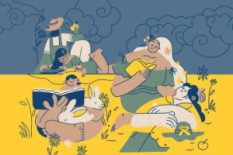The war in Ukraine prompts a reevaluation of many things that should lead to global transformations. Oksana Taranenko, a renowned artist in Ukraine and beyond, has written a column for our publication to contemplate and search for answers to the question of why the world habitually ignores evil. Her thought-provoking reflections and uncomfortable questions, we hope, will help all of us reconsider our views on the world, including the realm of art.
War is difficult to accept. It's hard to get up in the morning and go to bed in the evening, realizing that half of your friends are in the trenches or hospitals. It is difficult to feel helpless in the face of the enormity of the horrors of war. But the worst thing is that the war does not end, and therefore it is completely impossible to realize that evil is stronger than good. It changes your entire understanding of the world and its values. Because the war in your country is your problem.
A new quality that I observe around me is the habit of ignoring evil. I never thought there were so many people around with this habit. I am trying to explore this phenomenon, as far as observation and analytics are sufficient. As a director, I have a professional skill - to look for the deep meaning and motive behind every gesture and action.
The first question is: what is the significance and motive for the widespread use of the Russian repertoire in classical music and opera? Until now, it is already clear to everyone that Russia has always used its art as an element of propaganda and is now using it in a hybrid war. First the Russian Empire, then the Soviet Empire, and its direct successor, the Russian Federation, skillfully and successfully promoted their chauvinist narratives, their illusion of superiority, and their budgets through music and literature. Yes, the importance of Tchaikovsky cannot be overestimated, and Rachmaninov did not kill anyone, but let's look at things more broadly. Russia is killing right now, bombing our peaceful cities right now, why does the opera and ballet industry ignore this context and continue to support Russia, promoting its art? After all, in this way, the crimes of the terrorist country are tolerated and it continues to look positive. In Ukraine now we live with only one criterion: does what I do or say help Ukraine to win? All our thoughts and efforts are aimed only at victory. Of course, I cannot demand this from my European or American colleagues - to live with the thought of a Ukrainian victory - but can’t they at least stop supporting our enemy? At least until we win and the criminals pay for their crimes?
There is also a purely German practice, which began just after 2014, of composing cultural projects in which Russian and Ukrainian musicians are invited. And wonder why Ukrainians always refuse. I don’t remember that after World War II, Jews and Nazis performed together. On the contrary, all the artists who collaborated, even indirectly, with the Nazis were never again allowed into decent places and decent stages. Rudolf Bing, the famous director of the Metropolitan Opera from 1949 to 1973, writes about this in detail in his book “5000 Nights at the Opera”.
In March 2023, at a conference in Wiesbaden, the artistic director of the local opera shouted in my face - who did Netrebko kill? Why should I not invite her to participate in the festival? Art is higher than politics, and her name sells tickets in 24 hours! Higher or lower, I don’t know, but it was Netrebko, and no one else, who was not too lazy to support the separatists in Donetsk, hypocritically handing them a check for a million rubles supposedly to support the Donetsk Opera House. This is after a Russian bomb hit the theater warehouse, destroying all the scenery, and the director died of a broken heart. Netrebko did not choose neutrality, she chose the aggressor. And the Wiesbaden Festival quite deliberately chose a non-neutral singer. How can we talk about values and motives now? What conclusions should my directorial mind come to? That Wiesbaden values criminals, that support for the aggressor is tolerated in the world of opera? It’s hard for me, who had 10 friends killed at the front in January 2023 alone, including ballet dancers, singers, and a conductor, to wrap my head around this.
Another example. Young Ukrainian bass Vasyl Slipak, performed in France at such venues as Paris Opera and Opéra Bastille. For his opera performance, Slipak received several awards, including "Best Male Performance" for the Toreador Song, chose the duty of a warrior, left his career, and returned to Ukraine to defend his homeland. And in 2016 he died from a sniper’s bullet in Donbass. Although he could have chosen the neutrality supposedly inherent in art.
Not a single Ukrainian opera has ever been performed or is being performed in any theater in the world. Not because Ukrainian operas are bad or there are none, there is simply no such habit. Theater directors do not want to take risks by staging the unknown. At the same time, at opera conferences, my European colleagues are seriously concerned about the conservatism and closed nature of the genre and are looking for ways to update and refresh the repertoire by holding special panels and discussions. This obvious contradiction also does not fit in my head. Such closeness could be understandable if the music of Ukrainian composers belonged to a different tradition, like Chinese or Japanese, was based on different harmonic laws and was too exotic for the European ear. But most of the Ukrainian composers of the 18th and 19th centuries studied in Europe, and people who love Moniuszko, Smetana, and Janacek would understand the meanings and forms written by Ukrainians. Not to mention modern composers who were brought up in the global information space. I wrote more than a hundred letters to the intendants of various theaters with samples of music and other information, hoping for the magic of cultural diplomacy and asking for support. No one has responded yet, but I will write more.
What exactly fits in my head, lives in my values and motivations is that music can best tell about who we are – Ukrainians. Music, painting, literature - any type of art. In a world in which everyone has long known about the “great” ballet, nesting dolls, and Tolstoy, and in which they learned about the fact that Carol of the Bells is a Ukrainian song thanks to the war, it is apparently really difficult to choose the side of the Ukrainians. Little is known about Ukrainians; there is nothing to associate them with. We didn’t have time to tell the world about ourselves - we were simply killed by our neighbors all the time. Ukrainian artistic achievements deserve a series of publications or films, and I really hope that media people will have the energy and time to create them. Why they are still unknown - the answer is simple. They were either appropriated by the empire, banned, or their authors were killed, and with them their legacy. And over the past thirty years of independence, we have only just begun to raise our heads after colonial oppression and try to assert ourselves. And again we fell under outright genocide.
It seems to me that in the modern world, which lives by democratic values, it is not difficult to see the difference between Russian and Ukrainian values. The Russians have killed and are killing, but the Ukrainians are not afraid and do not give up. And they won't give up. It seems to me that at least for this we deserve a little more attention and curiosity.
In September 2022, we staged a large-scale premiere at the Odessa Opera House - more than 100 people on stage, with complex scenery, and many costumes. We were hampered by constant air raids, bombed workshops, and lack of finance, but we did it because we considered it our contribution to victory. In November, our colleagues at the Lviv Theater also released their premiere. For the creation of a new Ukrainian opera and work in such difficult conditions, the Odesa and Lviv opera houses received the highest award - the International Opera Awards. Of course, we were pleased that our efforts were so highly appreciated, and that through us the European opera industry supports all Ukrainian artists. But this year the award was given to a production of a Russian opera by a Russian director, and I, as the winner of last year, was forced to present it. I don’t know what motivation motivated the high jury and what message Ukrainians should receive now. According to my feelings, this act devalues all our losses and struggles, all our efforts to survive in unequal conditions. And this convinces us that we are alone in the face of a huge enemy.
Of course, Ukrainians are grateful for the shelter and bread that many European countries have provided them, but Russian aggression is not a natural disaster like a tsunami or earthquake. The natural disaster is passing, but the war continues, and if it is not ended soon, there will be many more Ukrainian refugees, that is, people who will need even more shelter and bread. And this burden will again fall on the shoulders of Europeans.
I believe in cultural sanctions and consider them no less effective than economic ones. The more ties still are maintained with Russia, the stronger it becomes, and the more impunity it feels. The more shells it produces, the more Ukrainians die. Maybe by refusing a ticket to a performance with a conditional Netrebko, you will save some of my musician friends who are now in the trenches. Although you can choose neutrality, and then more of us will die.
Returning to values - we are fighting for the opportunity to be independent, for the opportunity to be ourselves, for the preservation of identity. For the opportunity to live in their own homes, on their own land. We believe that these values are as close to the democratic community as they are to us. But for now, Russian operas are heard in the best theaters in the world, Russian pilots fly fighter planes with bombs on board, Russian workers produce shells in three shifts, and Russian guards beat stolen Ukrainian children in Russian orphanages.
We want to survive. And make the world richer. You can help us. If you have time.







